Category: Academic

Before they were foxy ladies, they were lady foxes: Yoginīs and Ḍākinīs in Hindu and Buddhist Tantra
Before they were foxy ladies, they were lady foxes: Yoginīs and Ḍākinīs in Hindu and Buddhist Tantra
Prof. David G. White
27 January 2021, 2.00-3.00
Abstract: Before there was “tantric sex” there was “tantric violence,” which saw tantric yogis venturing alone into cremation grounds and other fearsome landscapes in the dead of night to offer their bodies up to Yoginīs and Ḍākinīs, noisy nocturnal hordes of flesh-eating female creatures that preyed on the living and the dead. The early tantric scriptural record, which relates the conditions under which males voluntarily offered themselves up for possession and consumption by these ferocious shape-shifters, offers a window onto the unique tantric appropriation of a pre-existing South Asian (if not pan-Eurasian) demonological substratum. In this lecture, I juxtapose scriptural and art historical data to demonstrate the persistence of this demonological paradigm across South, Inner and East Asian tantric traditions.
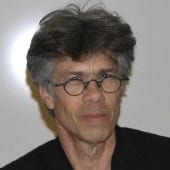 Prof. David G. White is the J. F. Rowny Professor of Comparative Religions at the University of California, Santa Barbara, where he has been teaching since 1996. Prior to coming to Santa Barbara, he taught at the University of Virginia between 1986 and 1996. There, he founded the University of Virginia Study Abroad Program in Jodhpur, India in 1994. White is the sole foreign scholar to have ever been admitted to the Centre d’Études de l’Inde et de l’Asie du Sud in Paris, France, where he has been an active Research Fellow since 1992. His current research interest concerns contacts and exchanges in matters of demonology. Prof. White’s book publications include The Yoga Sutra of Patanjali (Princeton University Press, 2014), Yoga in Practice (Princeton University Press, 2012), Sinister Yogis (University Press of Chicago, 2009), Kiss of the Yogini: “Tantric Sex” in its South Asian Context (University Press of Chicago, 2003), The Alchemy Body: Siddha Traditions in Medieval India (University Press of Chicago, 1996).
Prof. David G. White is the J. F. Rowny Professor of Comparative Religions at the University of California, Santa Barbara, where he has been teaching since 1996. Prior to coming to Santa Barbara, he taught at the University of Virginia between 1986 and 1996. There, he founded the University of Virginia Study Abroad Program in Jodhpur, India in 1994. White is the sole foreign scholar to have ever been admitted to the Centre d’Études de l’Inde et de l’Asie du Sud in Paris, France, where he has been an active Research Fellow since 1992. His current research interest concerns contacts and exchanges in matters of demonology. Prof. White’s book publications include The Yoga Sutra of Patanjali (Princeton University Press, 2014), Yoga in Practice (Princeton University Press, 2012), Sinister Yogis (University Press of Chicago, 2009), Kiss of the Yogini: “Tantric Sex” in its South Asian Context (University Press of Chicago, 2003), The Alchemy Body: Siddha Traditions in Medieval India (University Press of Chicago, 1996).

Lecture List Hilary Term 2021
Lecture List Hilary Term 2021
Due to Covid restrictions and in line with University Policy, all lectures and seminars will be held online. For access, please contact the convenors or lecturer by email. For access to the ‘Hinduism 2: Modern Hinduism’ and ‘Sanskrit Prelims’ lectures, please contact the Faculty of Theology and Religion. The Śākta Traditions lectures will be available on the OCHS YouTube channel.
Hinduism 2: Modern Hinduism
Week 1-8, Friday 4.00-5.00, Faculty of Theology & Religion
Dr Rembert Lutjeharms
This paper traces the development of Hinduism from the medieval period through to modernity. The course will examine Hindu scholasticism, devotional and tantric traditions, and modern Hindu thought. The lectures will explore themes of liberation, the soul and the divine, Tantra and meditation, devotional literature and the formation of modern Hindu identity.
Readings in Middle Bengali Devotional Literature: Female Gurus
Readings in Vedānta: Madhva’s Anuvyākhyāna
Week 1-8, Wednesday 10.00-11.00, OCHS Library
Dr Rembert Lutjeharms (rembert@ochs.org.uk)
Vedānta—theology grounded in the systematic exegesis of the Upaniṣads—has for centuries been the primary discourse for Vaiṣṇava thought. These reading sessions are intended for students who have at least an introductory knowledge of Sanskrit and are interested in Vedānta texts. This term we will be reading Madhva’s Anuvyākhyāna, his principal commentary on the Brahma-sūtras.
Sanskrit Prelims 2
Week 1-8, Monday 2.00-3.00, Friday 9.30-11.30
Dr Bjarne Wernicke-Olesen
The course provides an introduction to Sanskrit for the preliminary paper of the Theology and Religion Faculty in Elementary Sanskrit. A range of relevant Hindu and Buddhist texts will be chosen for translation and philological comment. The class is designed to introduce students of Theology and Religion to the essentials of Sanskrit grammar, syntax, and vocabulary and its importance for the exegesis of Sanskrit texts. Students will learn to appreciate the interpretative nature of translation as a central discipline for the study of religions. By the end of the course students will have gained a basic competency in translating classical Sanskrit and reading relevant passages from texts, such as the Chāndogya Upaniṣad, the Bhagavadgītā and the Buddhist Heart Sūtra. The course book will be Walter Maurer’s The Sanskrit Language. Sanskrit Prelims continues throughout Michaelmas and Hilary Terms and for the first four weeks of Trinity.
Readings in Phenomenology
Weeks 1-8, Monday 12.00-1.00
Gavin Flood (gavin.flood@theology.ox.ac.uk)
Phenomenology is one of the most important developments in philosophy in the twentieth century, and it has also had a deep impact on other theoretical fields more widely conceived. This series continues the reading of Martin Heidegger’s Being and Time.
Readings in Middle Bengali Devotional Literature: Female Gurus
Weeks 1-8, Thursday 4.00-5.00
Lucian Wong (lucian@ochs.org.uk)
In these sessions, we read and discuss prominent Middle Bengali religious texts. This term we will focus on sections from key texts among the Vaiṣṇava hagiographical corpus that portray women as leaders in the early modern Gauḍīya Vaiṣṇava tradition. Some proficiency in the Bengali language is a requirement for attending these sessions.
Other Lectures
Śākta Traditions Online Lecture Series: Contributions to a growing field of Śākta Studies
Lecture I: Before they were foxy ladies, they were lady foxes. Yoginīs and Ḍākinīs in Hindu and Buddhist Tantra
Week 2, Wednesday 2.00-3.00, OCHS YouTube channel
Prof. David G. White
Abstract: Before there was ‘tantric sex’ there was ‘tantric violence’, which saw tantric yogis venturing alone into cremation grounds and other fearsome landscapes in the dead of night to offer their bodies up to Yoginīs and Ḍākinīs, noisy nocturnal hordes of flesh-eating female creatures that preyed on the living and the dead. The early tantric scriptural record, which relates the conditions under which males voluntarily offered themselves up for possession and consumption by these ferocious shape-shifters, offers a window onto the unique tantric appropriation of a pre-existing South Asian (if not pan-Eurasian) demonological substratum. In this lecture, I juxtapose scriptural and art historical data to demonstrate the persistence of this demonological paradigm across South, Inner and East Asian tantric traditions.
Prof. David G. White is the J. F. Rowny Professor of Comparative Religions at the University of California, Santa Barbara, where he has been teaching since 1996. Prior to coming to Santa Barbara, he taught at the University of Virginia between 1986 and 1996. There, he founded the University of Virginia Study Abroad Program in Jodhpur, India in 1994. White is the sole foreign scholar to have ever been admitted to the Centre d’Études de l’Inde et de l’Asie du Sud in Paris, France, where he has been an active Research Fellow since 1992. His current research interest concerns contacts and exchanges in matters of demonology. Prof. White’s book publications include The Yoga Sutra of Patanjali (Princeton University Press, 2014), Yoga in Practice (Princeton University Press, 2012), Sinister Yogis (University Press of Chicago, 2009), Kiss of the Yogini: “Tantric Sex” in its South Asian Context (University Press of Chicago, 2003), The Alchemy Body: Siddha Traditions in Medieval India (University Press of Chicago, 1996).
Lecture II: New Light on Śāktism and Haṭhayoga
Week 4, Wednesday 2.00-3.00, OCHS YouTube channel
Dr James Mallinson
This lecture will build upon, and in many ways revise, ideas first presented in a lecture entitled ‘Śāktism and Haṭhayoga’, which I gave at the OCHS Śākta Traditions conference held in Oxford in 2011. I shall present a more detailed analysis of the Śākta contributions to Haṭhayoga as formalised in Sanskrit texts from the eleventh century onwards, focusing specifically on Buddhist, Śaiva and Vaiṣṇava tantric traditions. I shall argue that the distinctive techniques of haṭhayoga were innovations in Indian religious practice and show how the different Śākta traditions introduced different methods of physical yoga practice.
Dr James Mallinson is Reader in Indology and Yoga Studies at SOAS University of London. He is Chair of SOAS’s Centre for Yoga Studies and the Principal Investigator of the ERC-funded Hatha Yoga Project, for which he is preparing five critical editions of Sanskrit texts on physical yoga and a monograph on its early history. Dr Mallinson is the author of several books and articles on yoga, and the co-author, with Dr. Mark Singleton, of Roots of Yoga (Penguin Classics 2017).
Lecture III: Assessing medieval Śākta history in the light of Indian inscriptions
Week 6, Wednesday 2.00-3.00, OCHS YouTube channel
Dr Bihani Sarkar
This lecture focuses on the historical insights epigraphical evidence offers for our understanding of the development of the Goddess’s worship. Between the 7th and the 13th centuries CE, many epigraphs, etched on copper or stone slabs, on cave-temple entrances, or on the bases of statuary, were commissioned by subcontinental rulers and communities, which formalized grants to powerful forms of the Goddess and asserted devotion to them. These sources attesting Śākta piety plot the process of patronage of the Goddess cult, the consolidation of political authority through such patronage, strategies involved in the formation of kingdoms, who the worshippers of the Goddess were, modes of her worship, and the chief geographical centres of her influence.
Dr Bihani Sarkar: is Lecturer (Hourly-Paid, fixed term) in Religious Studies: Hinduism and Buddhism (University of Winchester), Associate Faculty Member of the Oriental Institute (University of Oxford), and Research Member of Common Room, Wolfson College (University of Oxford). Bihani’s publications include Heroic Shāktism: The Cult of Durgā in Ancient Indian Kingship, (Oxford University Press, 2017) and Classical Sanskrit Tragedy: the concept of suffering and pathos in Medieval India (Bloomsbury, forthcoming 2021).
Tantric Elements Embedded in a Purāṇic Context: the Example of the Māhātmyakhaṇḍa of the Tripurārahasya
Week 8, Wednesday 2.00-3.00, OCHS YouTube channel
Dr Silvia Linder
Abstract: The Tripurārahasya (TR) is a Sanskrit work of South Indian origin, probably composed around the 15th –16th century CE, and associated with the Śākta tradition of Tripurā, later known as Śrīvidyā. This lecture focuses on some Tantric ritual elements embedded in the Purāṇic-like mythical narrative of the Māhātmyakhaṇḍa (mk), the first of the two extant sections of the work, which celebrates the deeds of Tripurā and of the goddesses who are regarded as her manifestations, or shares. The topics discussed include: the initiation ceremony (dīkṣa), the mantra of Tripurā (Śrīvidyā), and the method of her worship (pūjā). A crucial component of this worship is the Śrīcakra, the yantra that is both the diagrammatic, yet dynamic, form of the Goddess, and the essential support for her meditation and ritual worship. In the mk of the TR, the Śrīcakra is transposed into a narrative element, and becomes the centre of the abode of Tripurā in the Island of Jewels (maṇidvīpa), as well as the pattern according to which the stronghold of Lalitā is constructed. It will be shown how the maṇidvīpa and the Śrīcakra retain their Tantric character and meaning in the TR, even as they are incorporated into a mythical narrative.
Dr Silvia Schwarz Linder has lectured in the past at the Leopold-Franzens-Universität in Innsbruck and at the University Ca’ Foscari in Venice. Presently she is Research Associate at the Institut für Indologie und Zentralasienwissenschaften of the University of Leipzig, and is affiliated with the Śākta Traditions project at the OCHS led by Professor Gavin Flood and Dr Bjarne Wernicke-Olesen. Her interests focus on the Tantric religious traditions of the Śrīvidyā and of the Pāñcarātra, specifically on the philosophical and theological doctrines expressed in the relevant South Indian Sanskrit textual traditions. She has also translated into Italian texts from the Sanskrit narrative and devotional literature, for editions aimed at a general readership

Hinduism and the Goddess – Śāktism and Śākta traditions
Śākta Traditions Online Lecture Series MT20
Watch the final lecture of the Śākta traditions Online Lecture Series by Dr Bjarne Wernicke-Olesen.

Śākta Traditions Online Lecture Series MT20
Śākta Traditions Online Lecture Series MT20
On Wednesday, 16 December from 2.00-3.00 we will have our final lecture in the Śākta Traditions Online Lecture Series this term. The final lecture is given by Dr Bjarne Wernicke-Olesen and the title is “Hinduism and the Goddess – Śāktism and Śākta traditions”.
Programme for Michaelsmas Term 2020
Śākta Traditions Online Lecture Series: Work in Progress
Śāktism among the Śaivas
Abstract: In the first of these three lectures Professor Sanderson covers the history of Śaivism, setting out his view of its principal divisions, their historical development, and their interaction, and locating on this map the entry point of an influx of Śākta Śaiva forms of ecstatic religion into what had previously been a cluster of austere, highly ascetic traditions. In the second he narrows his focus to examine the history of Śaivism in Kashmir, concentrating on the nature of its Śākta Śaiva elements, notably the traditions of the Trika and Krama, but stressing the importance of seeing how these were embedded within, and interacted with, more exoteric forms of the religion. In the third lecture, he presents evidence that these Śākta Śaiva traditions developed and flourished outside Kashmir in most regions of the subcontinent and that though much of their later highbrow literature was modelled on the learned exegesis of Abhinavagupta and Ksemarāja there are reasons to conclude that they had pre-Kashmirian histories.
The second and third lectures demonstrate incidentally the inappositeness of the widely used term ‘Kashmir Śaivism’ to refer to the Trika and related Śākta Śaiva systems, the second by showing that these systems co-existed in Kashmir with non-Śākta, Saiddhāntika Śaivism, and the third by refuting or casting doubt on the notion that the Śākta Śaiva systems that received such learned attention in Kashmir in the tenth century were Kashmirian in origin
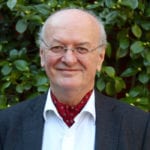 Prof. Alexis Sanderson: after a training in Classics, began his Indological career as a student of Sanskrit at Balliol College, Oxford in 1969. After graduation he spent six years studying the Kashmirian Śaiva literature in Kashmir with the Śaiva scholar and guru Swami Lakshman Joo from 1971 to 1977 while holding research positions at Merton and Brasenose Colleges. From 1977 to 1992 he was Associate Professor (University Lecturer) of Sanskrit in the University of Oxford and a Fellow of Wolfson College. In 1992 he was elected to the Spalding Professorship of Eastern Religions and Ethics at Oxford and thereby became a Fellow of All Souls College. He retired from that post in 2015. Since then he has been preparing a critical edition, with a translation and commentary, of the Tantrāloka, Abhinavagupta’s monumental exposition of the Śākta Śaivism of the Trika.
Prof. Alexis Sanderson: after a training in Classics, began his Indological career as a student of Sanskrit at Balliol College, Oxford in 1969. After graduation he spent six years studying the Kashmirian Śaiva literature in Kashmir with the Śaiva scholar and guru Swami Lakshman Joo from 1971 to 1977 while holding research positions at Merton and Brasenose Colleges. From 1977 to 1992 he was Associate Professor (University Lecturer) of Sanskrit in the University of Oxford and a Fellow of Wolfson College. In 1992 he was elected to the Spalding Professorship of Eastern Religions and Ethics at Oxford and thereby became a Fellow of All Souls College. He retired from that post in 2015. Since then he has been preparing a critical edition, with a translation and commentary, of the Tantrāloka, Abhinavagupta’s monumental exposition of the Śākta Śaivism of the Trika.
Theology and Social Change in Śākta Tradition
 Prof. Gavin Flood: is Professor of Hindu Studies and Comparative Religion at Oxford University, Academic Director of the Oxford Centre for Hindu Studies, and Senior Research Fellow at Campion Hall. His publications include Religion and the Philosophy of Life (2019), The Truth Within: A History of Inwardness in Christianity, Hinduism, and Buddhism (2013), The Importance of Religion: Meaning and Action in Our Strange World (2012), and The Ascetic Self: Subjectivity, Memory, and Tradition (2004). He is also the General Editor of the series ‘The Oxford History of Hinduism’ and is a Fellow of the British Academy.
Prof. Gavin Flood: is Professor of Hindu Studies and Comparative Religion at Oxford University, Academic Director of the Oxford Centre for Hindu Studies, and Senior Research Fellow at Campion Hall. His publications include Religion and the Philosophy of Life (2019), The Truth Within: A History of Inwardness in Christianity, Hinduism, and Buddhism (2013), The Importance of Religion: Meaning and Action in Our Strange World (2012), and The Ascetic Self: Subjectivity, Memory, and Tradition (2004). He is also the General Editor of the series ‘The Oxford History of Hinduism’ and is a Fellow of the British Academy.Śāktism in Europe
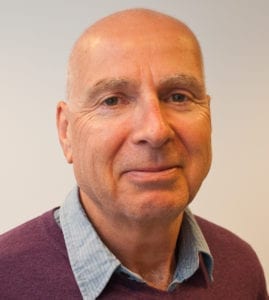 Prof. Knut Axel Jakobsen: is professor in the study of religions at the University of Bergen, Norway. Jacobsen’s main research fields are Hindu Studies, classical and contemporary Sāṃkhya and Yoga, South Asian pilgrimage traditions and ideas and rituals of space and time, and diasporas and the globalization of South Asia religions. He is the author of Prakṛti in Sāṃkhya-Yoga: Material Principle: Religious Experience, Ethical Implications (Peter Lang, 1999), Kapila: Founder of Sāṃkhya and Avatāra of Viṣṇu (Munshiram Manoharlal, 2008), Pilgrimage in the Hindu Tradition: Salvific Space (Routledge, 2013) and Yoga in Modern Hinduism: Hariharānanda Āraṇya and Sāṃkhyayoga (Routledge, 2018). Other recent publications include the edited volumes Routledge Handbook of Contemporary India (Routledge, 2016). Jacobsen is the founding Editor-in-Chief of the six volumes Brill’s Encyclopedia of Hinduism (Brill, 2009-2015) and the Brill’s Encyclopedia of Hinduism Online, and editor of the two volumes Handbook of Hinduism in Europe (Brill, 2020).
Prof. Knut Axel Jakobsen: is professor in the study of religions at the University of Bergen, Norway. Jacobsen’s main research fields are Hindu Studies, classical and contemporary Sāṃkhya and Yoga, South Asian pilgrimage traditions and ideas and rituals of space and time, and diasporas and the globalization of South Asia religions. He is the author of Prakṛti in Sāṃkhya-Yoga: Material Principle: Religious Experience, Ethical Implications (Peter Lang, 1999), Kapila: Founder of Sāṃkhya and Avatāra of Viṣṇu (Munshiram Manoharlal, 2008), Pilgrimage in the Hindu Tradition: Salvific Space (Routledge, 2013) and Yoga in Modern Hinduism: Hariharānanda Āraṇya and Sāṃkhyayoga (Routledge, 2018). Other recent publications include the edited volumes Routledge Handbook of Contemporary India (Routledge, 2016). Jacobsen is the founding Editor-in-Chief of the six volumes Brill’s Encyclopedia of Hinduism (Brill, 2009-2015) and the Brill’s Encyclopedia of Hinduism Online, and editor of the two volumes Handbook of Hinduism in Europe (Brill, 2020).Hinduism and the Goddess - Śāktism and Śākta traditions
 Dr Bjarne Wernicke-Olesen: is a Research Lecturer at the centre and tutor in Hinduism, Buddhism and Sanskrit at the Faculty of Theology and Religion. He teaches courses, seminars and tutorials in Sanskrit, Pāli and Indian religions as well as courses and seminars on manuscript reading and theory and method in the Study of Religion. He is currently leading and managing a research project on Śākta Traditions and a research programme on the Comparative Study of Religion together with Prof. Gavin Flood. He is the founder of the OCHS Kathmandu Office and also the founder and supervisor of a student exchange programme with Aarhus University.
Dr Bjarne Wernicke-Olesen: is a Research Lecturer at the centre and tutor in Hinduism, Buddhism and Sanskrit at the Faculty of Theology and Religion. He teaches courses, seminars and tutorials in Sanskrit, Pāli and Indian religions as well as courses and seminars on manuscript reading and theory and method in the Study of Religion. He is currently leading and managing a research project on Śākta Traditions and a research programme on the Comparative Study of Religion together with Prof. Gavin Flood. He is the founder of the OCHS Kathmandu Office and also the founder and supervisor of a student exchange programme with Aarhus University.
Oxford Handbook of Meditation
The Oxford Handbook of Meditation
Our two fellows Prof. Gavin Flood and Dr Bjarne Wernicke-Olesen have both contributed with an article in the recently published Oxford Handbook of Meditation edited by Miguel Farias, David Brazier, and Mansur Lalljee. Prof. Flood’s article is on Tantra and Dr. Wernicke-Olesen has written about Yoga. Below are the two abstracts borrowed from Oxford Handbooks Online website.
‘Tantra’ abstract:
Meditation has been integral to Hindu and Buddhist tantric traditions, in particular involving visualization or visual contemplation, practiced as part of ritual and also in its own right in order to achieve the goals of liberation from the cycle of reincarnation and also to achieve pleasure or power in this and other worlds. Visual contemplation is particularly focused on the body envisioned as being pervaded by a vertical axis at a subtle level, along which are located different levels of experience associated with different levels of the hierarchical cosmos. Power is awakened through meditation that rises up through these levels up to the very highest realization. This visual contemplation is thought to be of the subtle body as the support of the soul that leaves the physical body at death. There is also meditation without visualization that emphasizes the flow of pure awareness. This essay examines these practices in the major Hindu tantric traditions focused on the deity Śiva with some reference to the traditions of the Goddess, Viṣṇu, and Buddhism. These traditions influence the later Yoga tradition and have been transformed in the modern West.
‘Yoga’ abstract:
Yoga, meditation, and asceticism have been intimately linked throughout Indian religious history since the early beginnings in the ascetic reformism of India’s “axial age.” Traditional yoga addresses the main concerns of the ascetic reformism and is a practical method to solve the problem of suffering and attain liberation from this world. It primarily refers to the practice of meditation as described and systematized in the later classical yoga of Patañjali, where yoga is a synonym for non-cognitive samādhi, the highest state of consciousness. As indicated in the Upaniṣads and the yoga-auxiliaries, meditation consists in stilling the body, the senses, and the mind through a withdrawal of the senses, breath-control, and fixing the mind on a single point (including god or īśvara) as a way to reach samādhi. These techniques were combined with Sāṃkhya philosophy and other ideas and terminology (especially Buddhist) from the ascetic reformism discourse and systematized into a whole by Patañjali in the Pātañjalayogaśāstra in the fourth century ce. Via this kind of Brahmanical Sanskritic adaptation of ascetic practices, yoga and meditation became gradually incorporated into the mainstream of Indian religious life and were successfully exported to the Western world almost two millennia later.
For a link to the handbook click here
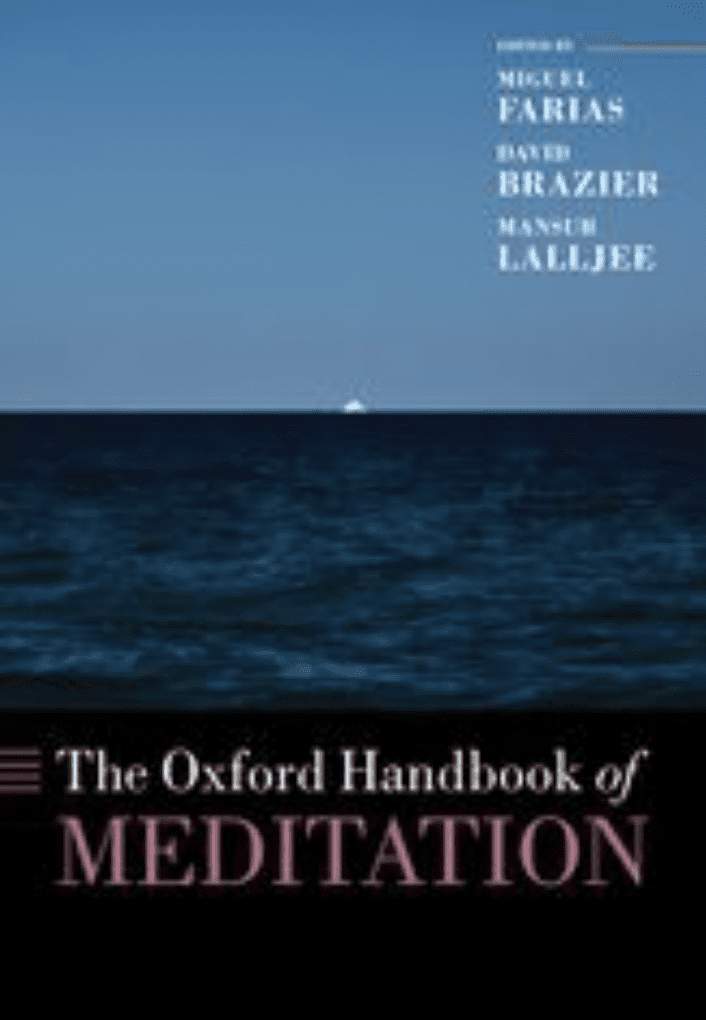

Śākta Traditions Lecture Series | Professor Sanderson
Śākta Traditions Lecture Series: Śāktism among the Śaivas

Śākta Traditions Online Lecture Series
Śākta Traditions Online Lecture Series
Project Conveners
Tanja L. Jakobsen
Lena Molin
Project Outline
It is widely recognised that Śāktism has a massive presence in India and Nepal, and that Hinduism cannot be understood without the Goddess (Devī/Śakti) and the goddess-oriented Śākta traditions. The Goddess pervades Hinduism at all levels, from aniconic village deities to high-caste pan-Hindu goddesses to esoteric, tantric goddesses.
The Śākta Traditions Online Lecture Series Project aims to carve out space for Śāktism as an area of research in its own right. The project is a compilation of the most prominent research already done in the field of Śākta Traditions, which can serve as educational material as well as a point of departure for further research on the subject.
The Śākta Traditions Online Lecture Series comprises three related online lecture series presented during the academic year of 2020/2021. The first is titled ‘Śākta Traditions Lecture Series: Work in progress’ and is presented in Michaelmas Term 2020. The second and third series are titled ‘Śākta Traditions Lecture Series: Contributions to a growing field of Śākta Studies’ and will be presented during Hilary Term 2021 and Trinity Term 2021.
The main goal of the project is to open up the academic field of Śākta Studies to a wider audience. In light of the covid-19 lockdown and the changes to the ways in which people now have to work and live the project consists of recorded lectures that are made widely available through the OCHS webpage, the Śākta webpage, and Youtube. Due to the online format of the lecture series, these contributions will be preserved and archived for the future and serve as an important resource for a budding field.
Project Output
- The project output is an online lecture series of four lectures in Michaelmas Term 2020 under the theme ’Śākta traditions: Work in Progress’, and four online lectures in Hilary Term 2021 and Trinity Term 2021 under the theme ‘Contributions to a growing field of Śākta Studies’.
- The lecture series has the potential to continue or to expand to include other fields of studies as well.
- We further aim towards a publication of the papers presented in the series. This could be through a special issue of the Journal of Hindu Studies or Routledge Tantric Studies Series.
Michaelmas Term 2020
Śākta Traditions Online Lecture Series: Work in Progress
Śāktism among the Śaivas
Abstract: In the first of these three lectures Professor Sanderson covers the history of Śaivism, setting out his view of its principal divisions, their historical development, and their interaction, and locating on this map the entry point of an influx of Śākta Śaiva forms of ecstatic religion into what had previously been a cluster of austere, highly ascetic traditions. In the second he narrows his focus to examine the history of Śaivism in Kashmir, concentrating on the nature of its Śākta Śaiva elements, notably the traditions of the Trika and Krama, but stressing the importance of seeing how these were embedded within, and interacted with, more exoteric forms of the religion. In the third lecture, he presents evidence that these Śākta Śaiva traditions developed and flourished outside Kashmir in most regions of the subcontinent and that, though much of their later highbrow literature was modelled on the learned exegesis of Abhinavagupta and Ksemarāja there are reasons to conclude that they had pre-Kashmirian histories.
The second and third lectures demonstrate incidentally the inappositeness of the widely used term ‘Kashmir Śaivism’ to refer to the Trika and related Śākta Śaiva systems, the second by showing that these systems co-existed in Kashmir with non-Śākta, Saiddhāntika Śaivism, and the third by refuting or casting doubt on the notion that the Śākta Śaiva systems that received such learned attention in Kashmir in the tenth century were Kashmirian in origin
 Prof. Alexis Sanderson: after a training in Classics, began his Indological career as a student of Sanskrit at Balliol College, Oxford in 1969. After graduation he spent six years studying the Kashmirian Śaiva literature in Kashmir with the Śaiva scholar and guru Swami Lakshman Joo from 1971 to 1977 while holding research positions at Merton and Brasenose Colleges. From 1977 to 1992 he was Associate Professor (University Lecturer) of Sanskrit in the University of Oxford and a Fellow of Wolfson College. In 1992 he was elected to the Spalding Professorship of Eastern Religions and Ethics at Oxford and thereby became a Fellow of All Souls College. He retired from that post in 2015. Since then he has been preparing a critical edition, with a translation and commentary, of the Tantrāloka, Abhinavagupta’s monumental exposition of the Śākta Śaivism of the Trika.
Prof. Alexis Sanderson: after a training in Classics, began his Indological career as a student of Sanskrit at Balliol College, Oxford in 1969. After graduation he spent six years studying the Kashmirian Śaiva literature in Kashmir with the Śaiva scholar and guru Swami Lakshman Joo from 1971 to 1977 while holding research positions at Merton and Brasenose Colleges. From 1977 to 1992 he was Associate Professor (University Lecturer) of Sanskrit in the University of Oxford and a Fellow of Wolfson College. In 1992 he was elected to the Spalding Professorship of Eastern Religions and Ethics at Oxford and thereby became a Fellow of All Souls College. He retired from that post in 2015. Since then he has been preparing a critical edition, with a translation and commentary, of the Tantrāloka, Abhinavagupta’s monumental exposition of the Śākta Śaivism of the Trika.
Theology and Social Change in Śākta Tradition
 Prof. Gavin Flood: is Professor of Hindu Studies and Comparative Religion at Oxford University, Academic Director of the Oxford Centre for Hindu Studies, and Senior Research Fellow at Campion Hall. His publications include Religion and the Philosophy of Life (2019), The Truth Within: A History of Inwardness in Christianity, Hinduism, and Buddhism (2013), The Importance of Religion: Meaning and Action in Our Strange World (2012), and The Ascetic Self: Subjectivity, Memory, and Tradition (2004). He is also the General Editor of the series ‘The Oxford History of Hinduism’ and is a Fellow of the British Academy.
Prof. Gavin Flood: is Professor of Hindu Studies and Comparative Religion at Oxford University, Academic Director of the Oxford Centre for Hindu Studies, and Senior Research Fellow at Campion Hall. His publications include Religion and the Philosophy of Life (2019), The Truth Within: A History of Inwardness in Christianity, Hinduism, and Buddhism (2013), The Importance of Religion: Meaning and Action in Our Strange World (2012), and The Ascetic Self: Subjectivity, Memory, and Tradition (2004). He is also the General Editor of the series ‘The Oxford History of Hinduism’ and is a Fellow of the British Academy.Śāktism in Europe
 Prof. Knut Axel Jacobsen: is professor in the study of religions at the University of Bergen, Norway. Jacobsen’s main research fields are Hindu Studies, classical and contemporary Sāṃkhya and Yoga, South Asian pilgrimage traditions and ideas and rituals of space and time, and diasporas and the globalization of South Asia religions. He is the author of Prakṛti in Sāṃkhya-Yoga: Material Principle: Religious Experience, Ethical Implications (Peter Lang, 1999), Kapila: Founder of Sāṃkhya and Avatāra of Viṣṇu (Munshiram Manoharlal, 2008), Pilgrimage in the Hindu Tradition: Salvific Space (Routledge, 2013) and Yoga in Modern Hinduism: Hariharānanda Āraṇya and Sāṃkhyayoga (Routledge, 2018). Other recent publications include the edited volumes Routledge Handbook of Contemporary India (Routledge, 2016). Jacobsen is the founding Editor-in-Chief of the six volumes Brill’s Encyclopedia of Hinduism (Brill, 2009-2015) and the Brill’s Encyclopedia of Hinduism Online, and editor of the two volumes Handbook of Hinduism in Europe (Brill, 2020).
Prof. Knut Axel Jacobsen: is professor in the study of religions at the University of Bergen, Norway. Jacobsen’s main research fields are Hindu Studies, classical and contemporary Sāṃkhya and Yoga, South Asian pilgrimage traditions and ideas and rituals of space and time, and diasporas and the globalization of South Asia religions. He is the author of Prakṛti in Sāṃkhya-Yoga: Material Principle: Religious Experience, Ethical Implications (Peter Lang, 1999), Kapila: Founder of Sāṃkhya and Avatāra of Viṣṇu (Munshiram Manoharlal, 2008), Pilgrimage in the Hindu Tradition: Salvific Space (Routledge, 2013) and Yoga in Modern Hinduism: Hariharānanda Āraṇya and Sāṃkhyayoga (Routledge, 2018). Other recent publications include the edited volumes Routledge Handbook of Contemporary India (Routledge, 2016). Jacobsen is the founding Editor-in-Chief of the six volumes Brill’s Encyclopedia of Hinduism (Brill, 2009-2015) and the Brill’s Encyclopedia of Hinduism Online, and editor of the two volumes Handbook of Hinduism in Europe (Brill, 2020).Hinduism and the Goddess - Śāktism and Śākta traditions I
 Dr Bjarne Wernicke-Olesen: is a Research Lecturer at the centre and tutor in Hinduism, Buddhism and Sanskrit at the Faculty of Theology and Religion. He teaches courses, seminars and tutorials in Sanskrit, Pāli and Indian religions as well as courses and seminars on manuscript reading and theory and method in the Study of Religion. He is currently leading and managing a research project on Śākta Traditions and a research programme on the Comparative Study of Religion together with Prof. Gavin Flood. He is the founder of the OCHS Kathmandu Office and also the founder and supervisor of a student exchange programme with Aarhus University.
Dr Bjarne Wernicke-Olesen: is a Research Lecturer at the centre and tutor in Hinduism, Buddhism and Sanskrit at the Faculty of Theology and Religion. He teaches courses, seminars and tutorials in Sanskrit, Pāli and Indian religions as well as courses and seminars on manuscript reading and theory and method in the Study of Religion. He is currently leading and managing a research project on Śākta Traditions and a research programme on the Comparative Study of Religion together with Prof. Gavin Flood. He is the founder of the OCHS Kathmandu Office and also the founder and supervisor of a student exchange programme with Aarhus University.Hilary Term 2021
Śākta Traditions Online Lecture Series: Contributions to a growing field of Śākta Studies
Before they were foxy ladies, they were lady foxes: Yoginīs and Ḍākinīs in Hindu and Buddhist Tantra
Prof. David G. White
27 January 2021, 2.00-3.00
Abstract: Before there was “tantric sex” there was “tantric violence,” which saw tantric yogis venturing alone into cremation grounds and other fearsome landscapes in the dead of night to offer their bodies up to Yoginīs and Ḍākinīs, noisy nocturnal hordes of flesh-eating female creatures that preyed on the living and the dead. The early tantric scriptural record, which relates the conditions under which males voluntarily offered themselves up for possession and consumption by these ferocious shape-shifters, offers a window onto the unique tantric appropriation of a pre-existing South Asian (if not pan-Eurasian) demonological substratum. In this lecture, I juxtapose scriptural and art historical data to demonstrate the persistence of this demonological paradigm across South, Inner and East Asian tantric traditions.
 Prof. David G. White is the J. F. Rowny Professor of Comparative Religions at the University of California, Santa Barbara, where he has been teaching since 1996. Prior to coming to Santa Barbara, he taught at the University of Virginia between 1986 and 1996. There, he founded the University of Virginia Study Abroad Program in Jodhpur, India in 1994. White is the sole foreign scholar to have ever been admitted to the Centre d’Études de l’Inde et de l’Asie du Sud in Paris, France, where he has been an active Research Fellow since 1992. His current research interest concerns contacts and exchanges in matters of demonology. Prof. White’s book publications include The Yoga Sutra of Patanjali (Princeton University Press, 2014), Yoga in Practice (Princeton University Press, 2012), Sinister Yogis (University Press of Chicago, 2009), Kiss of the Yogini: “Tantric Sex” in its South Asian Context (University Press of Chicago, 2003), The Alchemy Body: Siddha Traditions in Medieval India (University Press of Chicago, 1996).
Prof. David G. White is the J. F. Rowny Professor of Comparative Religions at the University of California, Santa Barbara, where he has been teaching since 1996. Prior to coming to Santa Barbara, he taught at the University of Virginia between 1986 and 1996. There, he founded the University of Virginia Study Abroad Program in Jodhpur, India in 1994. White is the sole foreign scholar to have ever been admitted to the Centre d’Études de l’Inde et de l’Asie du Sud in Paris, France, where he has been an active Research Fellow since 1992. His current research interest concerns contacts and exchanges in matters of demonology. Prof. White’s book publications include The Yoga Sutra of Patanjali (Princeton University Press, 2014), Yoga in Practice (Princeton University Press, 2012), Sinister Yogis (University Press of Chicago, 2009), Kiss of the Yogini: “Tantric Sex” in its South Asian Context (University Press of Chicago, 2003), The Alchemy Body: Siddha Traditions in Medieval India (University Press of Chicago, 1996).
New Light on Śāktism and Haṭhayoga
Dr James Mallinson
10 February 2021, 2.00-3.00
Abstract: This lecture will build upon, and in many ways revise, ideas first presented in a lecture entitled Śāktism and Haṭhayoga which I gave at the OCHS Śākta Traditions conference held in Oxford in 2011. I shall present a more detailed analysis of the Śākta contributions to haṭhayoga as formalised in Sanskrit texts from the eleventh century onwards, focusing specifically on Buddhist, Śaiva and Vaiṣṇava tantric traditions. I shall argue that the distinctive techniques of haṭhayoga were innovations in Indian religious practice and show how the different Śākta traditions introduced different methods of physical yoga practice.
 Dr James Mallinson: is Reader in Indology and Yoga Studies at SOAS University of London. He is Chair of SOAS’s Centre for Yoga Studies and the Principal Investigator of the ERC-funded Hatha Yoga Project, for which he is preparing five critical editions of Sanskrit texts on physical yoga and a monograph on its early history. Dr Mallinson is the author of several books and articles on yoga, and the co-author, with Dr. Mark Singleton, of Roots of Yoga (Penguin Classics 2017).
Dr James Mallinson: is Reader in Indology and Yoga Studies at SOAS University of London. He is Chair of SOAS’s Centre for Yoga Studies and the Principal Investigator of the ERC-funded Hatha Yoga Project, for which he is preparing five critical editions of Sanskrit texts on physical yoga and a monograph on its early history. Dr Mallinson is the author of several books and articles on yoga, and the co-author, with Dr. Mark Singleton, of Roots of Yoga (Penguin Classics 2017).
Assessing medieval Śākta history in the light of Indian inscriptions
Dr Bihani Sarkar
24 February 2021, 2.00-3.00
Abstract: In studies of religious history in early India, inscriptions have sometimes been overlooked as conveying ‘mundane’ information about secular aspects of religion considered unimportant. Religious texts, philosophical and liturgical, and practices, on the other hand, have received comparatively greater interest as vehicles of doctrine, mythology and tradition. In recent years, scholarship on Indian religions has begun to show the importance of inscriptional material for a more precise historical and conceptual understanding of Indian religious traditions from the ‘early medieval’ period, Śaivism, Vaiṣṇavism, Tantric Buddhism and Śāktism. Not only do these pieces of material history offer basic information needed for the construction of any historical argument, such as dates, names, and places, but they can reveal wider conceptual and political narratives. How were deities conceived and described? How did temples grow powerful? How did local deities grow powerful? Why were donors making grants? Who were the donors? What kinds of donations did they make? What rituals were performed for the recipient deities? Which were the important devotee-lineages? And much more.
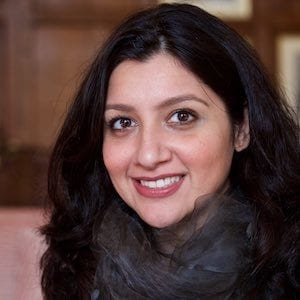 Dr Bihani Sarkar: is Lecturer (Hourly-Paid, fixed term) in Religious Studies: Hinduism and Buddhism (University of Winchester), Associate Faculty Member of the Oriental Institute (University of Oxford), and Research Member of Common Room, Wolfson College (University of Oxford). Bihani’s publications include Heroic Shāktism: The Cult of Durgā in Ancient Indian Kingship, (Oxford University Press, 2017) and Classical Sanskrit Tragedy: the concept of suffering and pathos in Medieval India (Bloomsbury, forthcoming 2021).
Dr Bihani Sarkar: is Lecturer (Hourly-Paid, fixed term) in Religious Studies: Hinduism and Buddhism (University of Winchester), Associate Faculty Member of the Oriental Institute (University of Oxford), and Research Member of Common Room, Wolfson College (University of Oxford). Bihani’s publications include Heroic Shāktism: The Cult of Durgā in Ancient Indian Kingship, (Oxford University Press, 2017) and Classical Sanskrit Tragedy: the concept of suffering and pathos in Medieval India (Bloomsbury, forthcoming 2021).View the lecture here:
Tantric Elements Embedded in a Purāṇic Context: the Example of the Māhātmyakhaṇḍa of the Tripurārahasya
Dr Silvia Schwarz Linder
10 March 2021, 2.00-3.00
Abstract: The Tripurārahasya (TR) is a Sanskrit work of South Indian origin, probably composed around the 15th-16th century CE, and associated with the Śākta tradition of Tripurā, later known as Śrīvidyā. This lecture focuses on some Tantric ritual elements embedded in the Purāṇic-like mythical narrative of the Māhātmyakhaṇḍa (mk), the first of the two extant sections of the work, which celebrates the deeds of Tripurā and of the goddesses who are regarded as her manifestations or shares. The topics discussed include: the initiation ceremony (dīkṣa), the mantra of Tripurā (Śrīvidyā) and the method of her worship (pūjā). A crucial component of this worship is the Śrīcakra, the yantra that is both the diagrammatic yet dynamic form of the Goddess, and the essential support for her meditation and ritual worship. In the mk of the TR the Śrīcakra is transposed into a narrative element and becomes the centre of the abode of Tripurā in the Island of Jewels (maṇidvīpa), as well as the pattern according to which the stronghold of Lalitā is constructed. It will be shown how the maṇidvīpa and the Śrīcakra retain their Tantric character and meaning in the TR, even as they are incorporated into a mythical narrative.
Dr Silvia Schwarz Linder is a Research Associate at the Institut für Indologie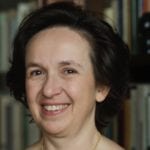 und Zentralasienwissenschaften of the University of Leipzig and a Research Fellow at the Oxford Centre for Hindu Studies, affiliated with the Śākta Traditions Programme. Her interests focus on the Tantric religious traditions of the Śrīvidyā and of the Pāñcarātra, specifically on the philosophical and theological doctrines expressed in the relevant South Indian Sanskrit textual traditions. Her publications include: The Philosophical and Theological Teachings of the Pādmasaṃhitā, Verlag der Österreichischen Akademie der Wissenschaften, Wien 2014 and Goddess Traditions in India: Theological Poems and Philosophical Tales in the Tripurārahasya, Routledge Hindu Studies Series, forthcoming.
und Zentralasienwissenschaften of the University of Leipzig and a Research Fellow at the Oxford Centre for Hindu Studies, affiliated with the Śākta Traditions Programme. Her interests focus on the Tantric religious traditions of the Śrīvidyā and of the Pāñcarātra, specifically on the philosophical and theological doctrines expressed in the relevant South Indian Sanskrit textual traditions. Her publications include: The Philosophical and Theological Teachings of the Pādmasaṃhitā, Verlag der Österreichischen Akademie der Wissenschaften, Wien 2014 and Goddess Traditions in India: Theological Poems and Philosophical Tales in the Tripurārahasya, Routledge Hindu Studies Series, forthcoming.
Trinity Term 2021
Śākta Traditions Online Lecture Series: Contributions to a growing field of Śākta Studies
Hinduism and the Goddess - Śāktism and Śākta traditions II
 Dr Bjarne Wernicke-Olesen: is a Research Lecturer at the centre and tutor in Hinduism, Buddhism and Sanskrit at the Faculty of Theology and Religion. He teaches courses, seminars and tutorials in Sanskrit, Pāli and Indian religions as well as courses and seminars on manuscript reading and theory and method in the Study of Religion. He is currently leading and managing a research project on Śākta Traditions and a research programme on the Comparative Study of Religion together with Prof. Gavin Flood. He is the founder of the OCHS Kathmandu Office and also the founder and supervisor of a student exchange programme with Aarhus University.
Dr Bjarne Wernicke-Olesen: is a Research Lecturer at the centre and tutor in Hinduism, Buddhism and Sanskrit at the Faculty of Theology and Religion. He teaches courses, seminars and tutorials in Sanskrit, Pāli and Indian religions as well as courses and seminars on manuscript reading and theory and method in the Study of Religion. He is currently leading and managing a research project on Śākta Traditions and a research programme on the Comparative Study of Religion together with Prof. Gavin Flood. He is the founder of the OCHS Kathmandu Office and also the founder and supervisor of a student exchange programme with Aarhus University.Divinity and Femininity: Śakti in the world
Prof. Mandakranta Bose
19 May 2021, 2.00 – 3.00
Abstract: The recognition of the feminine as the animating power of existence is at the centre of Hindu religious thought and encapsulated in the concept of a female divinity, a goddess figure imagined in many forms but conceived as the unity termed śakti. It is she who is the active source of creation and its motive force. In principle, all women represent her in varying degrees, but since they do so mainly in her protective and nurturing functions, women’s social worth is measured in terms of their self-effacing service to their families. This selective application of religious thought has confined women’s roles within the home and the family, leaving them bereft of action and authority in the larger world. In recent decades women in Hindu society have attempted to reverse this power imbalance by asserting the unity of femininity and powerful goddesses, especially Kālī and Durgā. In this presentation, I will examine the idea of the divine feminine and trace how it has shaped the lives of women in Hindu society.
Prof. Mandakranta Bose: MA (Calcutta, UBC), MLitt, DPhil. (Oxon),  Fellow of the Royal Asiatic Society of Great Britain, the Royal Society of Canada, and the Oxford Centre for Hindu Studies, is Professor Emerita at the University of British Columbia, and former Director of its Centre for India and South Asia Research. She taught there in the departments of Religious Studies, Gender and Womens’ Studies, and the Institute of Asian Research. Professor Bose holds degrees in Sanskrit and Comparative Literature from the universities of Calcutta, UBC and Oxford. She specializes in Sanskrit texts of dramaturgy, religions of India, the Rāmāyaṇa, and Gender Studies, with major publications in all these fields. Her most recent publications are: Women in Hinduism (Oxford: in press with OCHS, 2021); “Dance in the Sanskritic Tradition: Building Bridges Between Text and Performance,” (article to be published in a memorial volume for the late Kapila Vatsyayan, Delhi: D. K. Printworld, 2021); The Goddess (Oxford: Oxford University Press, 2018); The Ramayana in Bengali Folk Paintings (New Delhi: Niyogi, 2016); “The Ramayana in the Hindu Tradition,” in Oxford Bibliographies in Hinduism (Oxford online 2016); “Theology, Sexuality and Gender in the Hindu Tradition,” in the Oxford Handbook of Theology, Gender and Sexuality, ed. Adrian Thatcher (Oxford: Oxford University Press, 2015).
Fellow of the Royal Asiatic Society of Great Britain, the Royal Society of Canada, and the Oxford Centre for Hindu Studies, is Professor Emerita at the University of British Columbia, and former Director of its Centre for India and South Asia Research. She taught there in the departments of Religious Studies, Gender and Womens’ Studies, and the Institute of Asian Research. Professor Bose holds degrees in Sanskrit and Comparative Literature from the universities of Calcutta, UBC and Oxford. She specializes in Sanskrit texts of dramaturgy, religions of India, the Rāmāyaṇa, and Gender Studies, with major publications in all these fields. Her most recent publications are: Women in Hinduism (Oxford: in press with OCHS, 2021); “Dance in the Sanskritic Tradition: Building Bridges Between Text and Performance,” (article to be published in a memorial volume for the late Kapila Vatsyayan, Delhi: D. K. Printworld, 2021); The Goddess (Oxford: Oxford University Press, 2018); The Ramayana in Bengali Folk Paintings (New Delhi: Niyogi, 2016); “The Ramayana in the Hindu Tradition,” in Oxford Bibliographies in Hinduism (Oxford online 2016); “Theology, Sexuality and Gender in the Hindu Tradition,” in the Oxford Handbook of Theology, Gender and Sexuality, ed. Adrian Thatcher (Oxford: Oxford University Press, 2015).
Interactions, Intersections, Interdependence: Śāktism and the Indian Vajrayāna
Prof. Harunaga Isaacson
02 June 2021, 2.00 – 3.00
Prof. Harunaga Isaacson: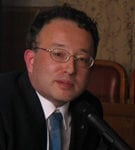 is Professor of Classical Indology at the University of Hamburg. His doctoral work at the University of Leiden was in classical Vaiśeṣika. He has been a Visiting Fellow at All Souls College, Wolfson College Oxford, and the International Institute for Buddhist Studies, Tokyo, and a Sabbatical Fellow of the American Philosophical Society. He is one of the world’s foremost experts in tantric traditions in pre-13th century South Asia, especially Vajrayāna Buddhism, and is an expert in classical Sanskrit poetry, classical Indian philosophy, Purāṇic literature, and manuscript studies.
is Professor of Classical Indology at the University of Hamburg. His doctoral work at the University of Leiden was in classical Vaiśeṣika. He has been a Visiting Fellow at All Souls College, Wolfson College Oxford, and the International Institute for Buddhist Studies, Tokyo, and a Sabbatical Fellow of the American Philosophical Society. He is one of the world’s foremost experts in tantric traditions in pre-13th century South Asia, especially Vajrayāna Buddhism, and is an expert in classical Sanskrit poetry, classical Indian philosophy, Purāṇic literature, and manuscript studies.
Hilary Term 2022
Śākta Traditions Online Lecture Series: Contributions to a growing field of Śākta Studies
Shaktism and Ethnography: Some Major Styles of Worship and Belief among Practitioners
Prof. June McDaniel
16 February 2022, 2.00-3.00
Abstract: The study of Shaktism is a relatively new field, and its primary methodologies have been historical and textual study. In this lecture, we shall examine some modern approaches to Shaktism, from the perspectives of practitioners and devotees. The regional focus will be West Bengal, India. Among practitioners today, there tend to be three strands or styles of Shakta understanding and practice. The first is the folk or tribal strand, which involves possession trance, dream commands and animism; its focus is a goddess immanent within nature. The second approach is the tantric or yogic strand, which involves meditation and spiritual disciplines. The goddess is understood as highest wisdom, brahmajnana; she is encountered in initiations, visualizations, spiritual travel and practice of the three Shakta bhavas. The third type is the devotional or bhakti strand, which involves the intense love of a particular form of the goddess. Shakti/Devi is willing to descend from her paradise to bless her human devotees, and her presence can be felt in religious worship. These types are often found in combined form, like strands of a rope braided together. However, there are tensions which exist within and between these strands. The folk/tribal strand often emphasizes regionalism and competition between local forms of the goddess. The tantric/ yogic strand opposes those goddesses who represent infinite consciousness with those magical goddesses who move through inner worlds and grant supernatural powers. The devotional strand has tensions between goddesses understood as individual living deities and goddesses who exist as symbols of universal principles. We shall also briefly note how traditional Shakta ideas have been incorporated into nationalism by politicians, and into hedonism by modern entrepreneurs.
Prof. June McDaniel: is Professor Emerita in History of Religions in the Department of Religious Studies at the College of Charleston. Her PhD was from the University of Chicago, and her MTS was from Emory University. Her research areas include Mysticism, Religions of India, Psychology of Religion, Women and Religion, and Ritual Studies. She did several years of field research in West Bengal, funded by Fulbright and the American Institute of Indian Studies, which focused on religious experience and modern Shaktism. Her books include: Lost Ecstasy: Its Decline and Transformation in Religion (Palgrave Macmillan, 2018), Offering Flowers, Feeding Skulls: Popular Goddess Worship in West Bengal (Oxford University Press, 2004), Making Virtuous Daughters and Wives: An Introduction to the Brata Rituals of Bengal (State University of New York Press, 2003), and The Madness of the Saints: Ecstatic Religion in Bengal (University of Chicago Press, 1989). Edited volumes include: Religious Experience in the Hindu Tradition. Religions (journal, Routledge 2019), and Perceiving the Divine through the Human Body: Mystical Sensuality, edited by Thomas Cattoi and June McDaniel. (Palgrave Macmillan, 2011). Her current work draws comparisons between Bengali and Balinese Hinduism, and examines religious emotion in different traditions.
in the Department of Religious Studies at the College of Charleston. Her PhD was from the University of Chicago, and her MTS was from Emory University. Her research areas include Mysticism, Religions of India, Psychology of Religion, Women and Religion, and Ritual Studies. She did several years of field research in West Bengal, funded by Fulbright and the American Institute of Indian Studies, which focused on religious experience and modern Shaktism. Her books include: Lost Ecstasy: Its Decline and Transformation in Religion (Palgrave Macmillan, 2018), Offering Flowers, Feeding Skulls: Popular Goddess Worship in West Bengal (Oxford University Press, 2004), Making Virtuous Daughters and Wives: An Introduction to the Brata Rituals of Bengal (State University of New York Press, 2003), and The Madness of the Saints: Ecstatic Religion in Bengal (University of Chicago Press, 1989). Edited volumes include: Religious Experience in the Hindu Tradition. Religions (journal, Routledge 2019), and Perceiving the Divine through the Human Body: Mystical Sensuality, edited by Thomas Cattoi and June McDaniel. (Palgrave Macmillan, 2011). Her current work draws comparisons between Bengali and Balinese Hinduism, and examines religious emotion in different traditions.
On the Devīpurāṇa’s Tantric Sources and Adaptations of Tantric Ritual
Prof. Shaman Hatley
02 March 2022, 2.00-3.00
Abstract: Unique among first-millennium purāṇas, the circa 8th–9th century Devīpurāṇa reveals deep familiarity with Tantric Śaivism. This lecture analyzes the Devīpurāṇa’s engagement with tantric rituals and sources, particularly the goddess-oriented Bhairavatantras, and argues that its integration of these is integral to its construction of a Śākta civic religion. The paper first outlines evidence for the Devīpurāṇa’s familiarity with Tantric Śaivism, including its first-hand knowledge of specific early tantras. The second section examines its re-purposing of tantric mantras for public ritual. Section three concerns the Devīpurāṇa’s blending of civic religion and esoteric ritual in its genre-bending descriptions of pilgrimage to Nandā and Sunandā, the Himalayan mountain-goddesses. The final section concerns how the Devīpurāṇa transformed the propitiation of yoginīs, tantric goddesses of the cremation grounds, into calendrical rituals for the benefit of the state. Far more than a collection of demon-slaying narratives, the Devīpurāṇa proves crucial for understanding the early-medieval religious landscape, and in particular, the roles of Śaiva tantric rituals and sources in the making of public Śāktism.
Prof. Shaman Hatley: is an Associate Professor of Asian Studies & Religious Studies at  The University of Massachusetts Boston. Prof. Hatley specialises in Asian religions, Hinduism, Sanskrit, tantric studies, Śaivism, yoga, Hindu goddess traditions, and medieval India. His research focuses on the tantric or esoteric traditions of medieval India, especially Tantric Shaivism, and on the premodern history of Yoga. Prof. Hatley completed his PhD in 2007 at the University of Pennsylvania under the direction of Harunaga Isaacson, after which he taught at Concordia University, Montréal, until 2014. His publications concern goddess cults, yoga, tantric ritual, and the technical terminology of the Śaiva tantras. Currently, he is preparing a monograph on the Yoginī cults of early medieval India, and a multi-volume study and critical edition of the Brahmayāmalatantra, one of the earliest surviving works of Śaiva tantric literature focused upon goddesses.
The University of Massachusetts Boston. Prof. Hatley specialises in Asian religions, Hinduism, Sanskrit, tantric studies, Śaivism, yoga, Hindu goddess traditions, and medieval India. His research focuses on the tantric or esoteric traditions of medieval India, especially Tantric Shaivism, and on the premodern history of Yoga. Prof. Hatley completed his PhD in 2007 at the University of Pennsylvania under the direction of Harunaga Isaacson, after which he taught at Concordia University, Montréal, until 2014. His publications concern goddess cults, yoga, tantric ritual, and the technical terminology of the Śaiva tantras. Currently, he is preparing a monograph on the Yoginī cults of early medieval India, and a multi-volume study and critical edition of the Brahmayāmalatantra, one of the earliest surviving works of Śaiva tantric literature focused upon goddesses.

Beyond Belief “The Face” on BBC Radio 4 with Dr Jessica Frazier
Beyond Belief "The Face" with Dr Jessica Frazier on BBC Radio 4
31 August 2020 Dr Jessica Frazier discussed the use of face masks in light of religion and Covid-19 with Joanna Moorhead, a freelance writer and Arts Editor for The Tablet and Rania Hafez, a Senior Lecturer in the School of Education at the University of Greenwich and a Fellow of the Muslim Institute.
The programme can be listened to here: https://www.bbc.co.uk/programmes/m000m577

Online Lectures by Dr Ulrik Lyngs
"Deus ex Machina: What Can Digital Humanities Offer Hindu Studies"
Online Lecture series by Dr Ulrik Lyngs
